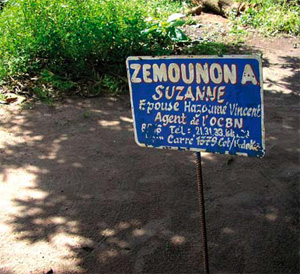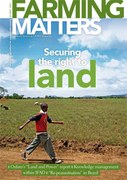Land governance is the process by which decisions are made regarding access to and use of land and natural resources, the manner in which those decisions are implemented, and the way that conflicting interests are reconciled. In rural areas, informal processes managed by families or communities are often more important for accessing land than statutory law and processes; hence the need for supporting these existing systems. The growing demand for land also means an increasing role for local governments.

is possible with the support of the local authorities. Photo: Thea Hilhorst
There is a growing interest in land. This is increasing the pressure on rural systems that already have to cope with more demand due to population growth. Consequently, competition over land and natural resources is growing: between men and women; between young people and older generations; within households and families; within user groups and between the urban-based elites and the rural populations.
All this is being intensified further by the arrival of new investors from outside the community. The prospect of (or rumours about) land acquisitions by investors or government erodes perceptions of tenure security. Following different approaches, local governments such as municipalities, can play an increasingly important role in these increasingly complex scenarios.
Local and informal responses to competition
One approach is the wider and more precise marking of boundaries, and better recordation of rights and transactions. This requires more use of paper, witnesses, and more markers on the ground (like stones or plants), and can be started by any of the parties in a transaction: land-holding families and customary leaders, NGOs or farmers’ organisations. An interesting example is the “petits papiers” seen in countries as far apart as Madagascar and Mali. These are contracts between farmers that are put on paper and prepared in the presence of witnesses to record sales and leases. Local governments in, for example Benin, are starting to play a role in improving the quality of the “petits papiers” by making standard forms available.
Another approach that is spreading is to engage local government officials as witnesses, and ask municipalities to keep a copy. In Burundi, local governments promote the taking of measures to prevent land-related conflict by encouraging the demarcation of fields using locally available materials, and promoting the registration of polygamous marriages. Without registration, women and children cannot inherit.
Yet another response is to develop local conventions that regulate access to collectively used resources, such as grazing areas and forests. Following negotiation, the agreements are written up and involve the engagement of local authorities. This approach has been spreading since the early 1990s, and is now also being supported and promoted by local governments. In other cases, local governments have prepared by-laws on land use and common pool resources (e.g. Niger, Ethiopia). In Mali, local governments are also involved in protecting livestock corridors, forests and fisheries.
Formally securing rights
Any increase in competition for land and natural resources, or rising fear of expropriation by the government, is accompanied by a growing demand for securing rights formally through land registration offices or local governments. The urgency of registering local rights to land and natural resources becomes even more important when investors are moving into the area, or when claims are being made by actors who do not adhere to the local ways. This is particularly needed in places where the local institutions in charge of managing resource tenure are breaking down and where conflict is becoming more entrenched and vicious.
The services to secure rights to land are not always found in rural areas, or are not appropriate or accessible (where appropriateness refers to services that are responsive to local requirements and circumstances, and accessibility concerns issues such as proximity, language and costs). Formal titling systems were set up in colonial times and after independence, but the percentages of titled land are low, and mostly in urban areas. Titling services are often expensive, poorly accessible and timeconsuming. In addition, when titling systems were rolled out in rural areas, inequity often increased as many – in particular, women, herders or indigenous communities – lost user rights giving access to land, trees or pastures. Titling has also accelerated the individualisation of rights, and the concentration of land.
The individualisation and privatisation of grazing land that used to be managed by the community or clan can strengthen the position of women and younger people in the short run – at least in those cases where they receive their share. But in the longer run, they may lose these assets when tempted to mortgage and sell to outsiders. Moreover, it undermines the wider pastoral production system because there is less land and fodder tree areas available.
New opportunities
Since the 1990s, a number of countries have reviewed their land policies and legislation, and have introduced new land administration approaches. These new policies are not just about protecting local rights in a better way: they also seek to promote investments and attract investors, something that is being increasingly attempted by governments and international institutions. They also provide openings for the decentralised administration of land and natural resources.
These policies seek to develop low cost and accessible forms of land administration, with approaches that combine pragmatism and flexibility. They take into account lessons learned from titling programmes and reflect a greater understanding and appreciation of customary systems of tenure, while acknowledging their bias against, for example, women or migrants. Among the common aspects we can see public inventories of (all) rights, boundary recognition, and also the demarcation and issuing of certificates. A shift towards some form of legal recognition of customary rights over land and natural resources is another general feature.
Inventories may cover all rural lands or only the farmed plots. Registration of customary rights may be done at the request of individuals, as seen in Burundi, Madagascar or Niger. Other countries pursue the nationwide systematic registration of user rights (e.g. Ethiopia, Rwanda). In Tanzania, villages have received a collective title, which is followed by the systematic registration of customary land undertaken and managed by the village.
Certificates may be kept at the village level (e.g. Tanzania, Malawi), at the local government level (e.g. Burkina Faso, Ethiopia) or as part of a national database (e.g. Madagascar, Rwanda). Experiences in Ethiopia and Burundi suggest that when the priority is to reduce community level conflicts and improve land justice, public recognition of boundaries and rights at the community level is the most important step.
Common lands are part of the registration process in Burkina Faso and Niger, but are not addressed in Burundi and Madagascar. Experience in Ethiopia shows that if the registration process does not include measures to protect rights to forested land and grazing lands, privatisation and degradation may accelerate. In southern Ethiopia, for example, farmers converted forested lands into fields to secure their claims.
New roles
Improving local tenure security on a massive scale, and not just for a few, requires the engagement of local institutional actors. But building sustainable institutions and mechanisms takes time, so the best option is to work through existing organisations, such as the local governments. It is therefore positive to see that, since the 1990s, there has been a (new) wave of institutional reform towards devolution in many African countries. This has led to the establishment of thousands of new local governments and to increasing responsibilities: in fact, in places where local governments were already in existence when new land policies were drafted, they became part of the implementation structure. Local governments may be in charge of land registration (with specialised units or staff, as in Benin, Burundi, Madagascar and Rwanda) or be expected to provide support to deconcentrated land administration services (e.g. Ethiopia).
New land policies often also propose the creation of committees at the community or local government level, assisting with the inventory of rights and registration, recording transactions and even promoting reconciliation: their work will make it possible to achieve scale at low cost. Committee members may be elected, proposed by the community, or appointed. In most countries, customary authorities are encouraged to become members or to collaborate with these committees.
Examples of such committees are the Land Administration Committee in Ethiopia, the commissions foncières in Niger, the commission de reconnaissance locale in Madagascar and Burundi, and the land adjudication committees in Rwanda. Making sure that women are part of these committees has proven to be a very important step towards equity in Ethiopia.
By way of conclusion
Land is a finite resource, and investors seem more aware of the growing scarcity than local communities. The traditional custodians of the land, the local community or farmer organisations, as well as the local users themselves, share the challenge of managing the growing conflicts over land and regulating land acquisitions by investors. There is much that they can do themselves to prevent conflict, such as promoting boundary demarcation, conducting mediation around inheritance and securing rights in general. But they can do much more with the support of the local authorities. This support is increasingly present.
Text: Thea Hilhorst
Thea Hilhorst works for the Royal Tropical Institute (KIT) in Amsterdam, the Netherlands, and co-ordinates the Academy on Land Governance (LANDac) – a joint effort of institutions including the Africa Study Centre, Agriterra, Hivos, Triodos Facet, the Ministry of Foreign Affairs and the universities of Utrecht and Wageningen (www.landgovernance.org).
Contact: t.hilhorst@kit.nl

